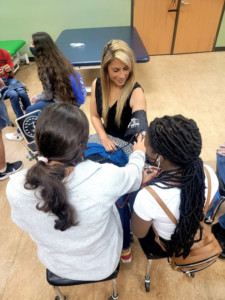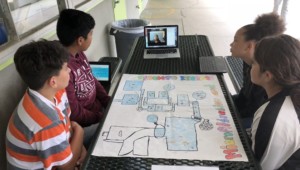The Future of Professional Development is Collaborative Development

By Brad Spirrison
Global education is predicated on the interconnectedness of educators who share values, ideas and resources from their own communities and networks with the world.
Technology and social media today provide teachers with access to an abundance of tools, voices and instructional approaches that originate from a variety of cultures and societies.
The knowledge, skills and attitudes required to become global-ready educators are now also essential attributes for teachers in the 21st century. Understanding how to effectively use the growing volume of intellectual capital–derived from applications, videos, online resources and social media conversations–requires motivation, experimentation and collaboration.
We are living through an empowering, albeit uncertain, time to be a teacher. There is an abundance of mostly free and standards-aligned digital resources that can be incorporated in daily classroom practices. Teachers unsure about where to begin, as well as those who enjoy sharing discoveries with others, can now participate in hundreds of self-organized Twitter chats to discuss best practices with peers. In this process, they expand professional learning networks, discover new instructional tools and share best practices with other educators.
A New Model for Professional Development?
Teachers who embrace Twitter, Slack and similar online platforms recognize that professional development can be achieved in part through collaboration with other educators. This type of collaborative learning is not as easily achieved through traditional professional development practices. Professional development in the digital age should be participatory in nature, where ideas and resources are exchanged and incorporated into instruction.
When a new push to reframe educator professional development occurs, teachers often ask themselves “What’s in it for me?”
A collaborative platform that facilitates resource discovery and best practices gives teachers ownership in their own professional development. As personal learning networks expand, teachers achieve more recognition in their school community and beyond.
Teachers are already taking advantage of the flexibility of online professional development, Twitter and other social networks to interact with peers and design programs based on their own interests. It’s more efficient to build upon inquiry already taking place, and allow space and permission to fail through experimentation with different resources across different contexts.
Ultimately, it’s about empowerment and self-discovery through the expansion of personal learning networks, and the ability to blend in voices, concepts and tools from all over the world.
Enter Dynamic Flexible Platforms
“VIF is constantly seeking opportunities to strengthen our ability to provide equitable, quality education. In order to achieve our vision, we will have to achieve scale. Participate Learning is a leading edtech company that will help us deliver flexible, cost-effective tools and resources to educators who make a lasting impact on students in classrooms around the world.”
~ David Young, CEO of VIF International Education
To support participatory professional development, VIF and Participate Learning built platforms focused on educator collaboration and resource discovery that help teachers incorporate new tools and ideas into instruction.
VIF’s Learning Center is designed to support collaborative online professional learning and classroom practice through a global lens. The online, asynchronous nature of the system provides flexibility for teachers to access and complete PD modules at any time, place and convenience–a flexibility that is critical to help teachers balance their demanding lifestyles.
Once they complete an evidence-based module, not only do teachers build and enhance their digital portfolios, they have created a ready-to-use, and thanks to digital badges, easy-to-share lesson plan for thousands of educators to learn from. In addition to PD modules created by VIF, the learning center also hosts customized state, district and school professional development.
Participate Learning’s platform is powered by making online “chats” and conversations among educators through Twitter and other channels more constructive. This is done through its extensive resource curation and collaboration tools that let teachers create and share digital resource collections around any subject or topic.
When hundreds of teachers converge on Twitter around scheduled hashtag conversations to discuss topics including kindergarten, incorporating Minecraft in the classroom and global education, they can easily see, collect and incorporate shared resources into their units and lesson plans. They can also consult curated transcripts from hundreds of conversations that take place each week to get advice on how to use suggested resources for a variety of contexts.
With VIF’s acquisition of Participate Learning, these two worlds of resource creation and curation, collaboration and professional development are about to integrate, extending the strength of both. In the coming months, visitors to the VIF Learning Center will find and experience advanced searching capabilities to enhance its platform and most importantly, resource library.
They will also find more VIF content, community, collections and collaborations at Participate Learning. During this time, VIF and Participate will be building toward full integration of the VIF Learning Center within the Participate Learning platform, which will also include a suite of mobile and native applications.
This is only the beginning.
We look forward to collaborating with you on the future of professional development.
For more, see:
- Designing Digital Learning Professional Development
- Getting Smart Podcast | Rethinking Educator Professional Development with Micro-credentials
Brad Spirrison is a communication specialist at Participate Learning. Follow them on Twitter at @participatelrn and VIF at @vifglobaled.
Stay in-the-know with all things EdTech and innovations in learning by signing up to receive the weekly Smart Update. This post includes mentions of a Getting Smart partner. For a full list of partners, affiliate organizations and all other disclosures please see our Partner page.






0 Comments
Leave a Comment
Your email address will not be published. All fields are required.